江苏省怀仁中学高一英语 M2U2 语法讲义(学生)
- 格式:doc
- 大小:169.50 KB
- 文档页数:5
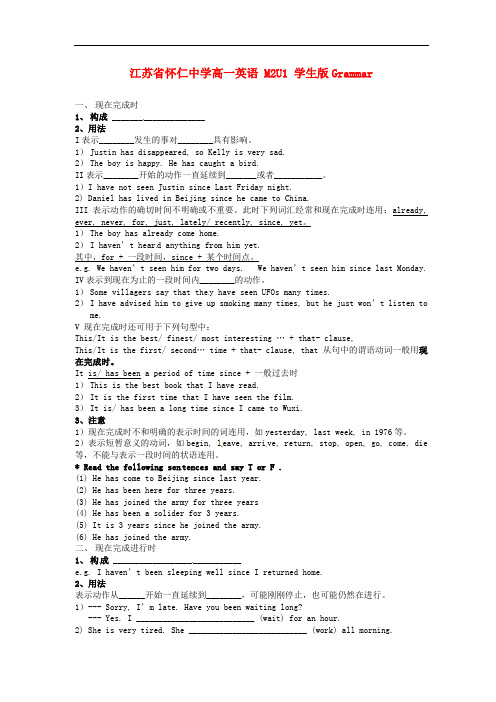
江苏省怀仁中学高一英语 M2U1 学生版Grammar一、现在完成时1、构成 _____________________2、用法I表示________发生的事对________具有影响。
1)Justin has disappeared, so Kelly is very sad.2)The boy is happy. He has caught a bird.II表示________开始的动作一直延续到_______或者___________。
1)I have not seen Justin since Last Friday night.2) Daniel has lived in Beijing since he came to China.III表示动作的确切时间不明确或不重要。
此时下列词汇经常和现在完成时连用:already, ever, never, for, just, lately/ recently, since, yet。
1)The boy has already come home.2)I haven’t hear d anything from him yet.其中,for + 一段时间,since + 某个时间点。
e.g. We haven’t seen him for two days. We haven’t seen him since last Monday. IV表示到现在为止的一段时间内________的动作。
1)Some villagers say that the y have seen UFOs many times.2)I have advised him to give up smoking many times, but he just won’t listen to me.V现在完成时还可用于下列句型中:This/It is the best/ finest/ most interesting … + that- clause,This/It is the first/ second… time + that- clause, that 从句中的谓语动词一般用现在完成时。
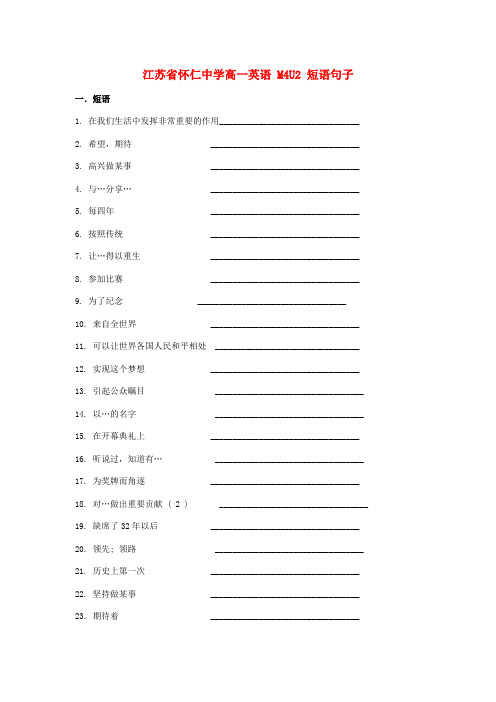
江苏省怀仁中学高一英语 M4U2 短语句子一.短语1. 在我们生活中发挥非常重要的作用________________________________2. 希望,期待 __________________________________3. 高兴做某事 __________________________________4. 与…分享… __________________________________5. 每四年 __________________________________6. 按照传统 __________________________________7. 让…得以重生 __________________________________8. 参加比赛 __________________________________9. 为了纪念 __________________________________10. 来自全世界 __________________________________11. 可以让世界各国人民和平相处 _________________________________12. 实现这个梦想 __________________________________13. 引起公众瞩目 __________________________________14. 以…的名字 __________________________________15. 在开幕典礼上 __________________________________16. 听说过,知道有… __________________________________17. 为奖牌而角逐 __________________________________18. 对…做出重要贡献 ( 2 ) __________________________________19. 缺席了32年以后 __________________________________20. 领先; 领路 __________________________________21. 历史上第一次 __________________________________22. 坚持做某事 __________________________________23. 期待着 __________________________________24. 尝试做某事 ( 2 ) __________________________________25. 加入某人做某事 __________________________________26. 使观众感兴趣 __________________________________27. 将…传递给… __________________________________28. 允诺做某事 ___________________________________29. 听从教练的建议 ___________________________________30. 建议某人做某事 (2) ___________________________________31. 忙于做… __________________________________32. 与…相似 __________________________________33. 受…欢迎 _________________________________34. 对…有用 __________________________________35. 打翻,撞倒 __________________________________36. 形状像 __________________________________37. 大受欢迎,很成功 ___________________________________38. 将…列入, 写入 __________________________________39. 满足需求 _________________________________40.(被)控制住 ___________________________________41. 给…让路 _________________________________42. 申请加入… __________________________________43. 与…相关 __________________________________44. 本来(不)应该做 __________________________________45. 这是最重要的。
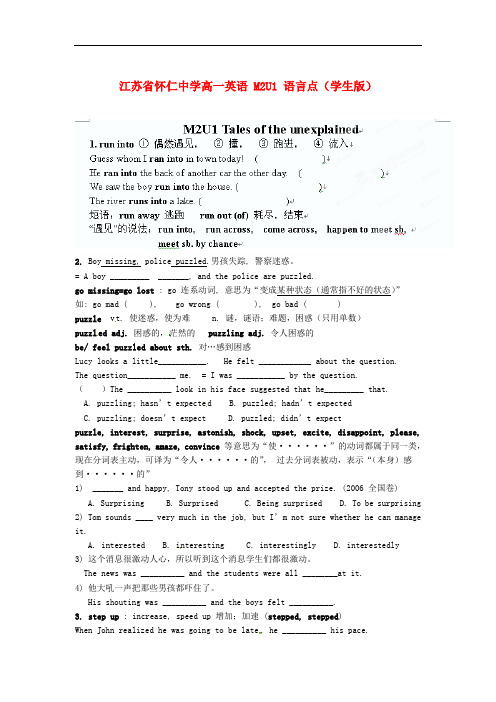
江苏省怀仁中学高一英语 M2U1 语言点(学生版)2. Boy missing, police puzzled.男孩失踪, 警察迷惑。
= A boy _________ _______, and the police are puzzled.go missing=go lost : go 连系动词, 意思为“变成某种状态(通常指不好的状态)”如: go mad ( ), go wrong ( ), go bad ( )puzzle v t. 使迷惑,使为难 n. 谜,谜语;难题,困惑(只用单数)puzzl ed adj. 困惑的,茫然的puzzling adj. 令人困惑的be/ feel puzzled about sth.对…感到困惑Lucy looks a little___________. He felt ____________ about the question.The question___________ me. = I was ___________ by the question.()The __________ look in his face suggested that he_________ that.A. puzzling; hasn’t expecte dB. puzzled; hadn’t expectedC. puzzling; doesn’t expectD. puzzled; didn’t expectpuzzle, interest, surprise, astonish, shock, upset, excite, disappoint, please, satisfy, frighten, amaze, convince 等意思为“使······”的动词都属于同一类,现在分词表主动,可译为“令人······的”,过去分词表被动,表示“(本身)感到······的”1) _______ and happy, Tony stood up and accepted the prize. (2006 全国卷)A. SurprisingB. SurprisedC. Being surprisedD. To be surprising2) Tom sounds ____ very much in the job, but I’m not sure whether he can manage it.A. interestedB. interestingC. interestinglyD. interestedly3) 这个消息很激动人心,所以听到这个消息学生们都很激动。
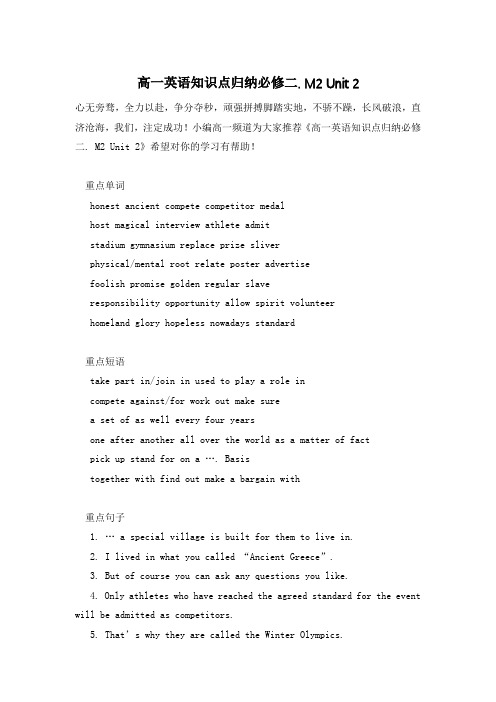
高一英语知识点归纳必修二. M2 Unit 2心无旁骛,全力以赴,争分夺秒,顽强拼搏脚踏实地,不骄不躁,长风破浪,直济沧海,我们,注定成功!小编高一频道为大家推荐《高一英语知识点归纳必修二. M2 Unit 2》希望对你的学习有帮助!重点单词honest ancient compete competitor medalhost magical interview athlete admitstadium gymnasium replace prize sliverphysical/mental root relate poster advertisefoolish promise golden regular slaveresponsibility opportunity allow spirit volunteerhomeland glory hopeless nowadays standard重点短语take part in/join in used to play a role incompete against/for work out make surea set of as well every four yearsone after another all over the world as a matter of fact pick up stand for on a …. Basistogether with find out make a bargain with重点句子1. … a special vil lage is built for them to live in.2. I lived in what you called “Ancient Greece”.3. But of course you can ask any questions you like.4. Only athletes who have reached the agreed standard for the event will be admitted as competitors.5. That’s why they are called the Winter Olympics.6. No other countries could join in, nor could slaves or women.7. It’s in the Summer Olympics that you have the running races, together with高一英语知识点归纳必修二. M2 Unit 2.。

四、什么动词后可有宾语补足语:1. 在表示心理状态的动词后作宾语补足语。
这类动词有:consider, think, believe, discover, find, imagine, judge, suppose, prove 等。
这类动词后的不定式通常是"to be+形容词或名词"结构,think, consider, find后的to be 常可省略。
We consider him (to be) a good teacher.我们认为他是一个好老师。
He proved that theory (to be) very important.他证明那个理论是很重要的。
I thought her (to be) nice and honest the first time I met her.我第一次见到她的时候就认为她人很好,很诚实。
2. 在表示情感状态的动词后作宾语补足语。
这类动词有:love, like, prefer, hate, want, wish, expect等。
I'd prefer you to leave him alone.我希望你不要打扰他。
I don't want there to be any trouble.我不想有任何麻烦。
3. 注意:hope, demand, suggest等动词后面不能接不定式作宾语补足语。
I hope you can give me a hand.我希望你能帮我一把。
I wish you to give me a hand.我希望你能帮我一把。
He required us to be present at the meeting.他要求我们出席会议。
Mr Li suggested that she should not go there alone.李先生建议她不要独自去那里。
五、可作宾语补足语的形式有:不定式,现在分词,过去分词,名词,形容,副词,介词短语都能作补语。
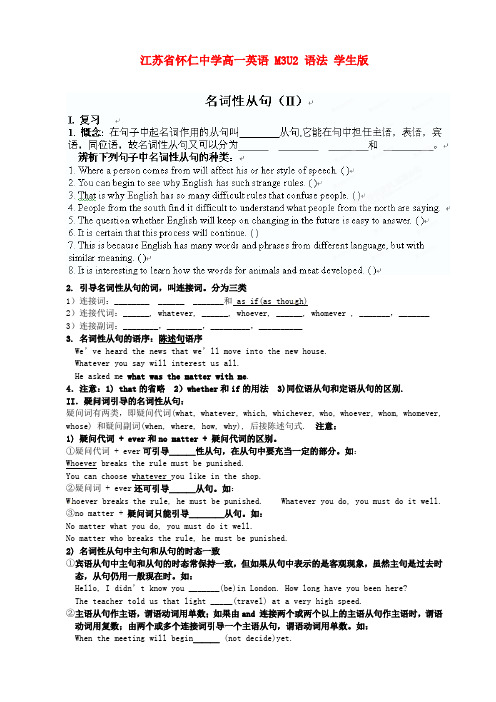
江苏省怀仁中学高一英语 M3U2 语法学生版2. 引导名词性从句的词,叫连接词。
分为三类1)连接词:________ ______ _______和 as if(as thou gh)2)连接代词:______, whatever, ______, whoever, ______, whomever , _______,_______3)连接副词:________,________,_________,__________3. 名词性从句的语序:陈述句语序We’ve heard the news that we’ll move into the new house.Whatever you say will interest us all.He asked me what was the matter with me.4.注意:1) that的省略 2)whether和if的用法 3)同位语从句和定语从句的区别.II.疑问词引导的名词性从句:疑问词有两类,即疑问代词(what, whatever, which, whichever, who, whoever, whom, whomever, whose) 和疑问副词(when, where, how, why), 后接陈述句式. 注意:1) 疑问代词 + ever和no matter + 疑问代词的区别。
①疑问代词 + ever可引导___性从句,在从句中要充当一定的部分。
如:Whoever breaks the rule must be punished.You can choose whatever you like in the shop.②疑问词 + ever还可引导___从句。
如:W hoever breaks the rule, he must be punished. Whatever you do, you must do it well.③no matter + 疑问词只能引导____从句。
Book 2 Unit 2 Be sporty, be healthyGrammar and usagePassive voice in the present continuous and present perfect tensesTeaching planTeaching aimsBy the end of this section, students will be able to:1.Understand the use of passive voice in the present continuous and present perfect tenses;2.Summarize general rules of the passive voice in the present continuous and present perfect tenses;3. Role-play an interview between a school news reporter and a PE teacher with the right tenses.Teaching key & difficult points1. To summarize the rules of passive voice in the present continuous and present perfect tenses;2. To write a passage with passive voice in the present continuous and present perfect tenses.Teaching proceduresStep 1 Lead-in1.The teacher shows some pictures on the screen and asks students to make sentences based on these pictures.2. The teacher makes students be aware of passive voice in the present continuous and present perfect tenses. The teacher asks students to correct their mistakes in sentence-making and work out basic rules of passive voice in the present continuous and present perfect tenses.Step 2 Presentation1.The teacher has students read the leaflet in Part A on Page 20 and find the sentences that use the passive voice in the present continuous and present perfect tenses.都用了现在进行时的被动语态,其谓语构成是:am/is/are+being+done。
2. in case conj. “以防,万一”,引导条件状语从句,或adv置于于句末,作状语in case of +名词或代词in that case 要那样的话 in any case无论如何 in no case 决不(1)John may phone tonight. I don’t want to go out _______he phones.(2)You’d better take an umbrella ____________ th e rain.(3)You’d better take an umbrella _____________it rains.(4)I do n’t think I’ll need any money but I will bring some_________.(5)I hope it will be fine tomorrow. _____________, we can go out for a picnic.(6)It’s too late in any case.(7)In no case will I give in.3. arrange Vt./Vi. 安排,准备 arrangement n.arrange sth. arrange to do sth arrange for sb. to do(1) 我们会安排好一切的。
.(2) 我已经安排今晚同他们见面 .(3) 我已经安排玛丽去机场接你。
.4.We eat and drink whatever they doWhatever adv./conj. 可引导名词性从句和状语从句(1) no matter +who(m) /where/which/what/how/when..=wh-+ever均能引导让步状语从句Whenever he comes to Beij ing, he will visit his teacher.=No matter when he comes…(2) 引导主语从句和宾语从句只能用who(m)ever, whatever, whichever,不可用no matter who(m) , no matter what, no matter which(3)however=no matter how引导让步状语从句时,常与形容词与副词连用Have a try:(1)No matter what he says, I won’t b elieve him. = he says, I won’t believe him.(2) You can eat (无论什么)you want.(3) (无论谁)breaks the law should be punished.(4) (不管多么)difficult the job is, we must try our best.5. supplyv. 供应,供给su pply sth to sb=supply sb. with sthprovide sth for sb=provide sb with sth 提供offer sb sth=offer sth to sb(主动)提供(1) The media supplies lots of information _______us every day.=The media supplies us _________ lots of information every day.(2) A pipe line will be built to some easte rn provinces gas.A. sendB. provideC. supplyD. offern.供应,供给,供给物 the supply of sth(1)The water company cut off the ____ of water for no good reasons.6. scare vt.惊吓,使害怕,使恐惧 adj. scared惊恐的; scary令人惊恐be scared at ….对…感到害怕. be scared to do害怕做… scare away吓跑1) His idea _______ me. 2) She ____________ at the strange n oise.3) People keep a dog ____________ thieves.4) He ____________________________ 他害怕晚上出去。
江苏省怀仁中学高一英语名词性从句2Step1. 复习改错1.You can begin to see why does English has so much strange rules.2.It is certain this process will continue.3.If we will go out this weekend depends on the weather.4.Tom said that he had eaten a lot and he was not hungry at all.5.I can’t make sure that she will like my present or not.6.The question of if English will keep on changing in the future is easy to answer. Step2. 疑问词引导的名词性从句疑问代词:在名词性从句中作主语、宾语、表语、定语。
疑问副词:在名词性从句中作状语。
1.The question is ____ you should do next.A. whatB. thatC. howD. why2. I don’t know _____ he goes to work everyday, by bike or on foot.A. whatB. whichC. whenD. how3. ______ the boy hid the toy is still unknown.A. whereB. whenC. thatD. what4. Do you know _____ comes first today?A. whoB. whomC. thatD. which5. It is generally considered unwise to give a child •__________ heor she wants.A. howeverB. whateverC. whicheverD. whenever6. Lei Feng was always thinking of •____ •he •could •help others.A. thatB. howC.whom D. which7. --Is that your watch?--No, I can't tell ________.A. whose is that watchB. whose watch isC. whose watch is thatD. whose watch that is8. ________ the meeting will begin has not been decided yet.A. WhatB. WhichC. WhenD. Whether9. There were so many presents and the boy didn’t know ______ he should choose.A. thatB. whichC. howD. where10. My car didn’t work this morning, and that’s ______ I was late for work.A. howB. whereC. whyD. whatStep3. what 与 that1.I don’t believe ________ he said.2._______ the boy is always late makes his teacher really angry.3.__________ it takes to be a good teacher is great patience.4.The result is _________ we lost the game.5.China is no longer _______ it used to be.6._________ is important in learning English is practicing.小结that 在名词性从句中_______ (有/没有)语义,在从句中______(充当/不充当)成分,并且_______(可以/不可以)省略(宾语从句中除外。
江苏省怀仁中学高一英语 M3U2 语言点学生版3. The English language is made up of the grammar and vocabulary these people brought to Britain.1) be made up of 由---组成、构成make out理解,辨认 make up 组成;弥补;编造;化妆;和好2) consist of由---组成常用整体作主语,表示“整体由部分组成”,无被动A由B组成 A be made up of B = A consist of B由B组成的A A made up of B = A consisting of BSociety ______ people with widely different abilities. The class is made up of twelve girls and twenty boys.= The class ________ ____ twelve girls and twenty boys.a team made up of five students= a team _______ ____ five students3) consist in 在于Happiness _______ _____ appreciating what you have. 快乐就在于满足所拥有的4. That is why English has so many difficult rules that confuse people.1)I was busy at that time. That is I did not go.2)He did not see the film last night. That is he had to help his little sister with her homework.5. Aside from place names such as London, very few Celtic words become part of Old English.aside from 1) 除…之外,相当于apart from或 except forEverything was quiet, aside from the occasional sound of a car in the distance. 除了远处偶尔有汽车的声响外, 四周一片寂静。
江苏省怀仁中学高一英语 M2U2 语法讲义(学生)Rules:一. 将来进行时构成:二. 主要用法:1.表示将来某一段时间内持续做的动作。
如2. 表示将来某个时刻正在发生的动作。
如3. 表示预计即将发生或势必要发生的动作。
如4. 表示委婉地询问对方或别人计划要做的事。
如三、将来进行时与一般将来时的比较:1. --I thought I asked you to fix the radio.--Oh, I am sorry. Mother, I______ it right now.A . will be doing B. will do C. was about to do D. am going to do2. We ____ dinner at seven o’clock when CCTV ____ to broadcast news.A. are having, will startB. will be having, startsC. will have, will startD. are going to have starts3. --- _______ you ________ your car this time tomorrow? My car is broken. CanI borrow yours to pick up a friend at the airport?--- You can take it. I ________ at home tomorrow watching TV.A. Will, be using; have been stayingB. Will, be using; will be stayingC. Have ,been using; have been stayingD. Have, used; will be stayingRules:1.一般将来时侧重意愿,而将来进行时则强调动作的。
I’ll work on this tomorrow.(表示意愿或许诺)I’ll be working on this tomorrow.(纯粹表示将来要发生的动作)2. 将来进行时比一般将来时在语气上更。
比较:When will you finish these letters? (只是问一个将来的事实)When will you be seeing Mr. White?(语气较委婉)第二部分:过去将来时Translate the following sentences.1. He said he would go to the north for the holiday.2.They wanted to know when you would finish the article.3. I thought he wouldn’t attend that evening party, but to our surprise he came. Rules:过去将来时构成:表示从过去某个时间看将要发生的动作或存在的状态。
当主句谓语动词用过去时态时, 用于间接引语或宾语从句中。
注意:过去将来还可用下列形式来表达,但含义有所不同:1. was/were going to do: 表示过去的主观打算。
但未必能实现。
1). We were going to leave, but then it rained.我们正打算离开,但这时下雨了。
2). I was going to visit the factory but in the end I went to the c ountry. 我当时打算去参观工厂的,但最终我去乡下了。
2. was /were about to do:即将发生的动作“刚要/正要做某事”,不能再与时间状语连用。
I was about to sit down when the telephone rang.我正要坐下这时电话响了。
3. start, go ,come, leave;see, meet类动词的过去进行时:表示就过去某一时刻而言即将发生的动作1). I didn’t know that they were coming until this morning.直到今天上午我才知道他们要来。
2). He was busy packing, for he was leaving that night.4. was/were t o do:表示“曾计划干什么”,如果表示“本来计划干什么,动作没实现”,则需用“was /were to have done”1). She said she was to tell me about the accident.她说她计划把事故的事告诉我。
2). She said she was to have told me about the accident. 她说她本来想告诉我事故的事的。
5. 用某些动词的一般过去形式,表按计划或时刻表要发生的事.1) They told me school began on September 1.2) He wanted to be a pilot when he grew up.Choose the best answer.1. In a room above the store, where a party ___, some workers were busily setting the table. A. was to be held B. has been held C. will be held D. is being held2.--A lice, why didn’t you come yesterday?--I______, but I had an unexpected visitor.A. hadB. wouldC. was going toD. did3. --What were you doing when Tony phoned you?--I had just finished my work and ____ to take a shower.A. startedB. was startingC. Have startedD. had started4. I am glad you’ve come, Miss Rose, I ____ you , but you’ve saved me the trouble,A. am going to callB. was about to callC. had calledD. am to call5.--The Chinese astronaut Yang Liwei is here already.-- I_______ he_______.A. think, is comingB. thought, would comeC. didn’t thin k, was comingD. don’t think, will comePractice makes perfect!1. He _____ (lie) on one of the sunny beaches in Hawaii all day when he spends his holiday there.2. Don’t call me between 2:00 and 4:00 this afternoon. I ________ (have) an test then.3. Nobody knew what ________ (happen) to the Earth in a century’s time.4. Mr. Lee said he would give the CD to me as soon as he ____ (return) from Canada.5. When we were young, father________(take) us for a special treat on Mother’s day.6. ----Did you invite Sarah to your birthday party?----Sorry, I forget. I _______ (call) her now.7. I ____ (tell) you about my plan, but you stopped me before I could speak.8. Will you __________(use)your computer this time tomorrow?9. I _______ (close) the kitchen door when a little mouse popped its head out. Choose the best answer.1. The Blacks with us for the time being.2. The plane at the present speed until it crosses the mountain at about ten tonight.A. would goB. wentC. will be goingD. goes3. Mr. Smith will not be able to attend the meeting tonigh t because ______ then.A. he must have a classB. he will be teaching a classC. he teaches a classD. he will have been teaching a class4. I won’t be able to watch the concert on TV tonight because I homework at that time. A. shall have done B. shall be doing C. shall do D. have been doing5. I _______ my boss at three this afternoon.A. shall be picking upB. shall be pickedC. shall have been picking upD. sha ll have picke d6. You can’t miss Frank. He______ a dark green suit and a yel low tie waiting for you.A. is wearingB. will wearC. wearsD. will be wearing7. ----Could you give these books to Mr. Black?----Absolutely, _______him at five o’clock this afternoon.A.I will have a talkB. I have a talk withC.I can have a talk withD.I will be having a talk with8. I’m afraid I won’t be available then. I _____ a friend off at three this afternoon.A. seeB. am seeingC. will seeD. will be seeing9. Next Friday I will go to another concert .They ____some thing by Mozart at that time. A. play B. will be playing C. are going to play D. are to play.10. ---What are you doing, Jack?---Making a model plane. I ____ it in the science class at 10 o’clock tomorrow morning. A. wi ll be showing B. am going to show C. show D. have shown11. We _____ a debate on some environmental issues all afternoon tomorrow.A. will be havingB. are havingC. are going to haveD. have12. What do you think you _____at this time next year?A .will do B. will be doing C. are about to do D. do13. ---What will you do tomorrow evening?---I _____my favorite program between 8 and 11, and then I will go out to drink in my usual bar.A. will watchB. am about to watchC. will be watchingD. am watching14. ---When will you come to see me, Dad?---I will go to see you when you_____ the training course.A. will have finishedB. will be finishingC. are finishinD. finish15. Tom sat under a tree and seeing his friend, up in no time.A. to standB. standingC. stoodD. would stand16. I _______ very happy if I could be of some service to you.A. would beB. have beenC. must beD. can be17. T he meeting was to at 9 o’clock but the manager until twenty minutes later.A. start; didn’t turn upB. have started; didn’t turn upC. start; hadn’t turned upD. be started; hadn’t turned up18. ---- he come to see you?----Of course, p lease. And I’d rather he me the truth.A.Will; informB.Shall; toldC.Should; would sayD.Can; spoke19. If the building project _____ by the end of this month is delayed, theconstruction company _____ fined.A. will be completed; is to beB. to be completed; will beC. being completed; will beD. completed; was20. ---- I rang you at about ten, but no one answered the phone.---- Oh, that was probably when I _______ my neighbor.A. visitedB. was going to visitC. was visitingD. had visited21. Because I the next day, I went to bed early on Saturday evening.A. was leavingB. will leaveC. had leftD. was about to leave22. ----Henry, fancy meeting you here.----Oh, it’s you Jack. Sorry, I ______ you ______ to me.A. didn’t think; were speakingB. don’t think; spokeC. didn’t think; would speakD. thought; are speaking23. By next summer John in this factory for thirteen years.A.has b een working B.will have been working C.will be working D.has worked 24. He will have learned English for eight years by the time he _______ from theuniversity next year.A. will graduateB. will have graduatedC. graduatesD. is to graduate25. I ______ the office when the telephone rang.A. was about to leaveB. would leaveC. leftD. was to leave26. According to their agreement reached in 1943, no country __ peace with Germany alone. A. is to make B. was to make C. would make D. was about to make27. He promised me if we____ the game, he ______us a round of drink.A. win; will buyB. would win; would buyC. won; boughtD. won; would buy28. He said time and time again that he _________, but he actually stayed well after midnight. A. is leaving B. was leaving C. was to leave D. will leave 29. ----Mom, I got the first prize in the spelling contest.----Oh, how great! Daddy will be so proud of you. He _____ you _____ to win.A. never think; are goingB. never thought; were goingC. didn’t think; were goingD. hadn’t thought; were going30. Tom_________ to Jerry and tell him about his new school at once.。